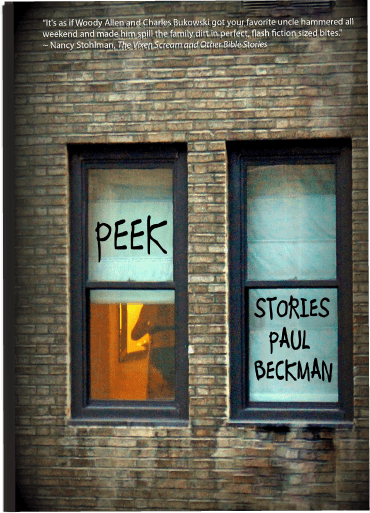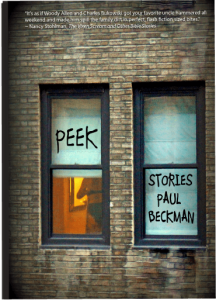Peek by Paul Beckman
-Reviewed by Eleanor Hemsley-
Paul Beckman explores the relationships between the peekers and the peeked at in this creative collection of flash fiction. Peek is a large and vast range of stories that show off his skill as a writer and his flexibility to easily move between completely different voices. The stories fit together so well that even though they’re all different, not one of them feels out of place amongst the others.
When it comes to flash fiction I have one rule: avoid one line, revelation endings. Sure, if you’ve found a way to do it, great, but otherwise avoid it. I was a bit disappointed to find the first story in this collection had one of them. And unfortunately, as most others like it, this one wasn’t done well. The story itself isn’t the strongest start to the collection, but the ending really lets it down. The last sentence is too wordy, trying to trap in as much information as possible to make the revelation as shocking as possible. But the result is just a forced punchline.
Beckman surprises later on though. In fact, I think he’s managed to write the one revelation ending that actually works. ‘Hard Times’ is a short story about adoption, and the last line really brings it home. It tugged viciously at my heartstrings and did exactly what a piece that short should do; it made me feel for the characters in it. And in just 133 words Beckman has created the strongest, and one of the shortest, stories in the collection.
I love how Beckman manages to subtly drop hints throughout a story and have them all come together at the end. ‘Green Guy, Whitey and Red’ does this so well, and being the second story in the collection it more than makes up for the wobbly start. The voice is well thought out and strong, giving Beckman a chance to show off his talent.
A couple of the stories are very unrealistic. I know they’re fiction, and so I know they’re not meant to be real, but I think every piece of fiction should have at least one aspect in it that makes it believable. ‘Can you keep a secret?’ is perhaps the worst for this. There are so many unrealistic things that the entire story falls to pieces. Why would Kathy make a phone call to tell someone a secret whilst sitting with six other people? Why would she even tell somebody that secret over the phone? And then of course there’s the badly-written speech. The two women’s reactions to each other speaking are terrible.
In flash fiction every word should have a purpose, but in this collection that’s not always the case. For example, in ‘What’s Fair is Fair’ I think the story could end at the bottom of the first page, and might even be better if it did. Similarly, in ‘Ratner Walking’, there’s a whole paragraph just repeating what was in the last, with only one, small, new bit of information in it.
A strong piece in this collection is ‘Circumstantial is Enough’. It’s a story about a man who is wrongly accused of a crime that is plastered across the front pages of every newspaper. When it’s found that he’s innocent, it’s only reported in a small section in the middle of the newspaper, so most people still think of him as a criminal. I just love how much this story reflects how the media tends to focus on the bad and not bother to report the good. I also love how it shows us how suspicious we are of each other; even an unsure accusation can lead to a person being alienated and abused.
Unlike the start of the book, the ending is just perfect. It took me a while to understand what was going on, but when I did I loved the idea. It’s a piece that makes you really think. It looks into human nature; how we all want to think of ourselves as good people and how we want validation for the good things we do. In the story, the protagonist tricks himself into thinking he’s doing good when he’s not. An example of this is where he goes to give money to buskers, but not before holding the money up and showing them what he’s giving. It’s almost like he’s giving not because he wants to help but more because he wants other people to think he cares. It’s a really strong and thought provoking story that finishes off the book perfectly.
Beckman has created a creative and gripping collection of flash fiction, and although there are weak moments the stronger ones more than make up for them. The stories are all separate from each other, with a new voice for every new protagonist and a fresh storyline for every page. Beckman has given us a teasing peek into his writing and I’m hoping it won’t be the only one.




